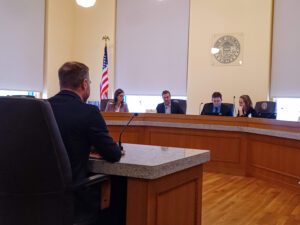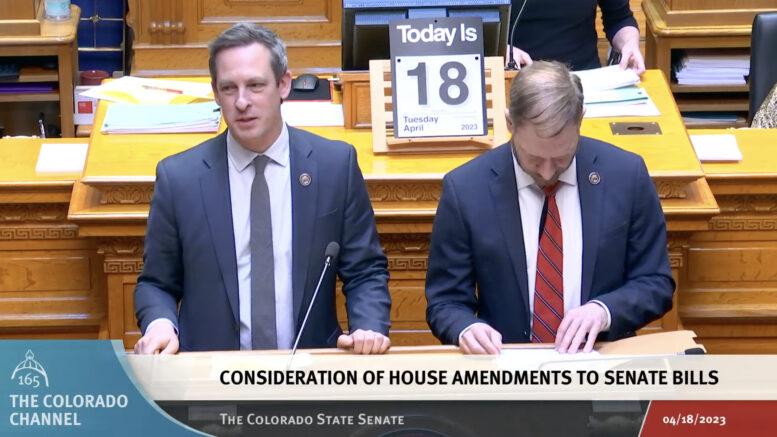Colorado’s recently enacted retail delivery fee isn’t going away. But at least it’s getting easier for retailers with delivery arms to administer.
Gov. Jared Polis on Thursday signed into law Senate Bill 143, which aims to fix what many businesses identify the most problematic aspect of the fee — that they must break out its cost on each bill and require their customers to pay the fee. Beginning on July 1, the businesses can pay the 27-cent fee themselves, and any company that did less than $500,000 in sales the previous year is exempt from having to pay the fee at all.
The retail delivery fee was one of a handful of fees created to help fund the $5.3 billion infrastructure package the Legislature passed in 2021 to speed electrification of the transportation system, boost multimodal transportation and put new money to state highways. It required any retailer that transported a good or had it transported by a third-party service — everyone from Amazon and DoorDash to home-based crafts makers hawking their goods online — to add 27 cents to the bill, which went to state transportation needs.
Problems with the retail delivery fee
Few people complained about the added cost to customers, particularly as it was practically unnoticeable in the greater picture of some transactions, such as auto dealers who delivered a newly purchased car to a home. But the administration of the fee frustrated many businesses for a variety of reasons when it went into law on July 1.
Requiring the fee be broken out separately on receipts would have required upgrades to retailer software systems that companies like building-supply provider Martin Marietta said would have cost thousands of dollars — more than they would collect from the fee in a seven-year period. Others said they would have preferred to just eat the 27-cent cost and remit it directly to the state but were prohibited by wording in the transportation-funding bill from doing so.
So, an unlikely pair of legislators — Democratic Senate President Steve Fenberg of Boulder, the sponsor of the transportation-funding bill, and Republican Sen. Kevin Van Winkle, arguably the most fiscally conservative member of his chamber — worked to fix the problem. SB 143 allows sellers to pay the fee on customers’ behalf and permits the smallest retailers — who were responsible for just 2.5 million of the 161.2 million deliveries on which the fee was applied in the second half of 2022 — to skip having to pay the fee at all.

Colorado state Sen. Kevin Van Winkle, co-sponsor of the bill to roll back some of the requirements of the retail delivery fee, presents the bill to the Senate Appropriations Committee in March.
“A good option”
Van Winkle, speaking earlier this year to the Colorado Chamber of Commerce’s Tax Policy Council, said the sponsors set the $500,000 sales exemption level by calculating the number of businesses it would exclude and deciding that constituted a good amount. While he’s always been an opponent of the fee in principle, he still was surprised how inconvenient and difficult it ended up being to pay, and he felt this was a way of helping people through those issues without stirring up a big political fight.
“Ultimately, my goal would be just to get rid of the fee altogether and find a better way to fund transportation,” Van Winkle said. “But because I live in political reality, this was a good option.”
A slight delay
SB 143 garnered unanimous approval in the Senate and passed the House over the “no” votes only of three Republicans angry that the bill didn’t go further in nixing the fee altogether. But its sponsors did have to push back the enactment date for the changes from April 1 to July 1 because they weren’t able to speed the bill through the process quickly enough to get it passed before April 1.
Still, Colorado Department of Revenue officials have promised not to enforce the provision of the law that requires retailers to break out the fee separately on receipts, meaning that in many ways that change to the current law now is in effect. While large delivery-network companies had no trouble getting the changes to their software systems into place, SB 143 is likely to be a boon particularly to smaller firms that can now go about their business, either without or without needing to set aside 27 cents more per transaction.
“My goal has been to free people from over-taxation and overregulation,” Van Winkle told the tax policy council. “What this really aims to do is simplify the process and provide true tax relief to the people of Colorado.”
